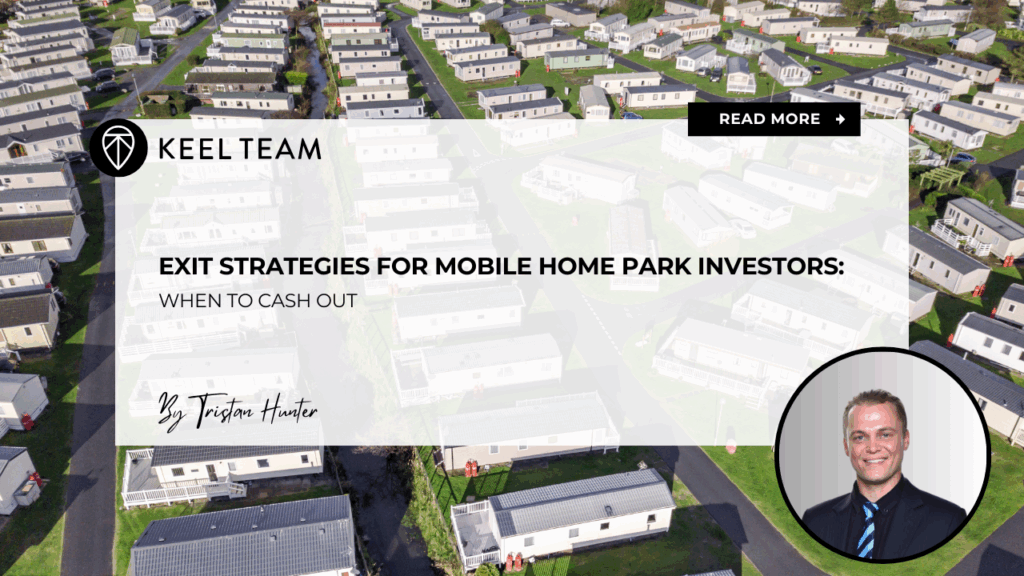Exit Strategies for Mobile Home Park Investors: When to Cash Out
-
 Tristan Hunter - Investor Relations
Tristan Hunter - Investor Relations

Mobile home park investing can offer potentially steady cash flow and long-term appreciation, but every investor eventually faces the question: When and how should you exit? Whether you’re seeking to liquidate your investment or reposition your capital, choosing the right exit strategy can maximize your return ceiling and align with your financial goals. This article explores two primary exit strategies—refinancing and selling—while providing actionable insights on timing, preparation, and execution. By understanding these options, it might help you make informed decisions to optimize your mobile home park investment(s).
Why Exit Strategies Matter for Mobile Home Park Investors
Exiting a mobile home park investment isn’t just about cashing out; it’s about strategically timing your move to capture value while minimizing risks. Market conditions, personal goals, and property performance all play a role. For instance, rising interest rates or shifts in local demand for affordable housing can influence your decision. A well-planned exit can help you reinvest in new opportunities, reduce debt, or diversify your portfolio. Let’s dive into the key considerations for deciding when and the two main exit strategies—refinancing and selling—that can help you achieve your goals.
Download our FREE eBook on the Top 20 things to know BEFORE investing in mobile home parks!
When to Consider Exiting Your Mobile Home Park Investment
Timing your exit can significantly impact your returns. While no one can predict market conditions with certainty, certain indicators may suggest it’s time to act. Here are key factors to consider:
Market Conditions and Economic Trends
Monitor local and national real estate trends. A strong seller’s market, characterized by high demand and low inventory, may signal an opportunity to sell at a premium. Conversely, if cap rates are compressing or interest rates are rising, refinancing might unlock capital without losing ownership. For example, in 2025, with affordable housing demand still strong, mobile home parks in growing regions may command higher valuations.
Property Performance and Value-Add Completion
If you’ve executed a value-add strategy—such as increasing occupancy, upgrading infrastructure, or raising lot rents—your mobile home park’s value may have peaked. This could be a prime time to sell or refinance to capture that increased equity. For instance, boosting occupancy from 70% to 95% can significantly raise net operating income (NOI), making the property more attractive to buyers or lenders.
Personal Financial Goals
Your exit may align with personal milestones, like retirement or portfolio rebalancing. If you’re a passive investor in a syndication, the partnership agreement’s timeline might dictate your exit. Alternatively, if you’re an active owner-operator, burnout or a desire to pursue other ventures may prompt action. Assess your goals to determine whether cash flow, capital gains, or liquidity is your priority.
Exit Strategy 1: Refinancing Your Mobile Home Park
Refinancing allows you to tap into your mobile home park’s equity without relinquishing ownership. This strategy can provide liquidity for new investments, debt reduction, or property improvements while maintaining long-term cash flow. Here’s how to approach refinancing effectively.
How Refinancing Works
Refinancing involves replacing your existing loan with a new one, ideally with better terms or a higher loan amount based on increased property value. For example, if your mobile home park’s NOI has grown due to higher rents or occupancy, a lender may offer a larger loan, allowing you to pull out cash. This cash-out refinance can fund other projects or reduce personal financial strain.
When to Refinance
Consider refinancing when interest rates are favorable or after significant value-add improvements. For instance, upgrading utilities or adding amenities like a community center can boost NOI, increasing your property’s appraised value. In 2025, with interest rates fluctuating, locking in a fixed-rate loan might protect against future hikes. However, always compare lender terms, as fees or prepayment penalties can erode savings.
Steps to Refinance Successfully
- Assess Property Value: Hire a professional appraiser to determine your mobile home park’s current value based on NOI and market cap rates.
- Shop for Lenders: Explore banks, credit unions, or specialty lenders familiar with mobile home parks. Commercial mortgage brokers can connect you with competitive options.
- Prepare Financials: Gather detailed records of income, expenses, and occupancy rates. Lenders prioritize NOI and debt-service coverage ratios.
- Evaluate Terms: Aim for lower interest rates or longer amortization periods to reduce payments. Be cautious of high loan-to-value ratios, which may increase risk.
- Use Proceeds Wisely: Reinvest the cash in new properties, upgrades, or debt reduction to strengthen your portfolio.
Pros and Cons of Refinancing
Refinancing can provide immediate liquidity without selling, allowing you to retain ownership and future appreciation. However, it increases debt, which could strain cash flow if occupancy drops or expenses rise. Additionally, closing costs and fees may reduce net proceeds. Weigh these factors against your long-term goals.
Exit Strategy 2: Selling Your Mobile Home Park
Selling your mobile home park can deliver a lump-sum payout, ideal for investors seeking to exit entirely or redeploy capital. A well-executed sale can capitalize on market demand for affordable housing assets. Here’s how to prepare and execute a successful sale.
When to Sell
Timing is critical. Consider selling when your mobile home park has reached peak performance, such as after completing value-add projects like infill or infrastructure upgrades. A strong local economy or high demand for mobile home parks in your region can also justify a sale. For example, in 2025, markets with growing populations and limited affordable housing may attract institutional buyers willing to pay premium prices.

Preparing Your Mobile Home Park for Sale
To maximize your sale price, take proactive steps to make your property appealing to buyers:
Optimize Operations
Streamline operations to boost NOI. Raise lot rents to market levels, reduce expenses, and maintain high occupancy. For instance, filling vacant lots with tenant-owned or park-owned homes can increase revenue.
Upgrade the Property
Invest in curb appeal and infrastructure. Simple upgrades like fresh landscaping, repaved roads, or modernized utilities can justify a higher asking price. Document all improvements to showcase value to potential buyers.
Organize Financial Records
Buyers, especially institutional investors, demand detailed financials. Provide at least two years of profit-and-loss statements, rent rolls, and occupancy data. Transparency builds trust and can speed up due diligence.
Finding the Right Buyer
Mobile home parks attract a range of buyers, from individual investors to large real estate investment trusts (REITs). Work with a commercial real estate broker specializing in mobile home parks to reach qualified buyers. Alternatively, consider listing on platforms like LoopNet or marketing to local investors. Highlight your property’s strengths, such as stable cash flow or growth potential, in all materials.
Structuring the Sale
Negotiate terms that align with your goals. For example, offering seller financing may attract buyers unable to secure traditional loans, potentially increasing your sale price. Be mindful of tax implications—consult a tax advisor to explore options like a 1031 exchange, which can defer capital gains taxes by reinvesting proceeds into another property.
Pros and Cons of Selling
Selling can provide significant capital for new ventures or personal goals, especially in a hot market. However, it means giving up future cash flow and appreciation. Transaction costs, such as broker fees and taxes, can also reduce net proceeds. Evaluate whether selling aligns with your long-term strategy.
Balancing Refinancing and Selling: Which Is Right for You?
Choosing between refinancing and selling depends on your goals, risk tolerance, and market conditions. Refinancing suits investors who want to retain ownership and access cash for growth, while selling is ideal for those ready to exit or capitalize on peak value. For example, if your mobile home park generates strong cash flow and you’re bullish on future appreciation, refinancing may be the better choice. Conversely, if you’ve maximized value or face operational challenges, selling could provide a clean exit.
Tips for a Smooth Exit
Regardless of your strategy, follow these best practices:
- Consult Professionals: Work with appraisers, brokers, and tax advisors to optimize your exit.
- Monitor Market Trends: Stay informed about cap rates, interest rates, and local demand to time your move.
- Plan for Taxes: Explore tax-deferral strategies like 1031 exchanges to preserve capital.
- Document Everything: Maintain meticulous records to streamline refinancing or sale processes.
Conclusion
Exiting a mobile home park investment requires careful planning and strategic timing. Refinancing can unlock equity while preserving ownership, ideal for investors eyeing growth. Selling, on the other hand, may offer a lump-sum payout, perfect for those ready to move on. By evaluating market conditions, property performance, and personal goals, you can choose the exit strategy that maximizes your return potential. Start preparing today—whether it’s organizing financials or exploring lender options—to ensure a smooth and profitable exit from your mobile home park investment.
Are you looking for MORE information? Book a 1-on-1 consultation with Andrew Keel to discuss:
- A mobile home park deal review
- Due diligence questions
- How to raise capital from investors
- Mistakes to avoid, and more!
Disclaimer:
The information provided is for informational purposes only and is not investment advice or a guarantee of any kind. We do not guarantee profitability. Make investment decisions based on your research and consult registered financial and legal professionals. We are not registered financial or legal professionals and do not provide personalized investment recommendations.

Tristan Hunter - Investor Relations
View The Previous or Next Post
Subscribe Below 👇





